People-Pleasing Fatigue: Why Being ‘Nice’ Leaves You Emotionally Exhausted (And How to Recover)
Ever felt like you’re bending over backwards to keep everyone happy, only to end up feeling totally wiped out and kinda resentful? Yeah, that’s people-pleasing fatigue in a nutshell – this sneaky emotional drain that comes from always putting others’ needs before your own, leaving you running on empty. In this article, we’ll dig into why it feels like such a trap, break down what it really is, spot the signs you’re dealing with it, and uncover the roots that keep it going strong. Curious about more on emotional burnout? Check out our piece on why your emotions feel too much for some eye-opening insights. For a deeper scientific look, here’s a solid read from Psychology Today on the downsides of people-pleasing. Oh, and stick around for our infographic on the exhaustion cycle – it’s a quick way to see if this hits home for you.
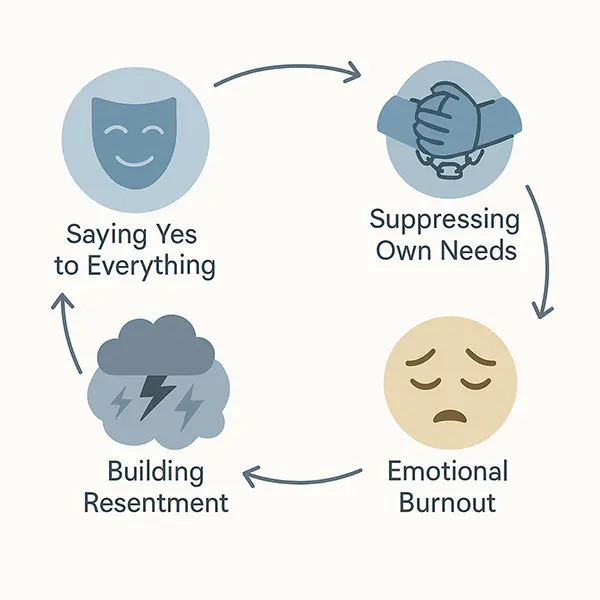
Introduction
Why People-Pleasing Feels Like a Trap
You know that moment when you agree to help a friend move again – even though your back’s killing you and your schedule’s packed? It starts off feeling good, like you’re the hero of the day, but by the end, you’re left wondering why you feel so hollow. People-pleasing sneaks up like that; it’s this habit of chasing approval that traps you in a loop of exhaustion.
I remember back in college, I was the go-to guy for group projects, always volunteering to do the extra work just to avoid any awkward tension. At first, it made me feel needed, but soon enough, I was skipping my own study time, feeling irritable, and snapping at little things. It’s not just about being nice it’s about how that ‘niceness’ slowly chips away at your energy, making every interaction feel like a performance. And honestly, in a world that praises self-sacrifice, it’s easy to miss how it’s wearing you down.

But here’s the kicker: this trap isn’t just personal it can hit harder for folks in marginalized groups, like the LGBT+ community, where blending in or overcompensating for acceptance adds another layer of fatigue. I knew someone in my circle who, as a queer individual, often went out of their way to be ‘extra agreeable’ at work to dodge any microaggressions, only to crash hard at home.
It’s exhausting, right? Over time, that constant vigilance builds up, turning simple interactions into energy vampires. If you’re nodding along, know that recognizing this is the first step not to beat yourself up, but to start reclaiming some of that lost spark.
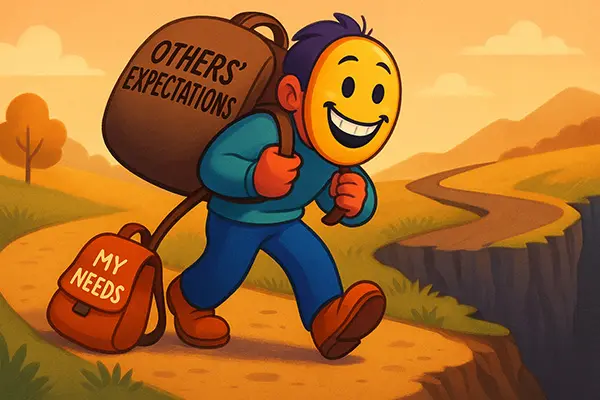
What Is People-Pleasing Fatigue?
Defining Emotional Exhaustion from People-Pleasing
People-pleasing fatigue is basically that bone-deep tiredness you get from constantly tweaking yourself to fit what others want, sacrificing your own peace in the process. It’s not just regular stress; it’s this chronic emotional wear-out where ‘being nice’ turns into a full-time job that pays in resentment and burnout. Think about it – you’re saying yes when you mean no, biting your tongue to avoid conflict, and over time, it piles up like unwashed laundry, making you feel scattered and unfulfilled.
From a psych perspective, experts at Verywell Mind describe it as a form of codependency that drains your emotional reserves, often linked to low self-worth. I once spent a whole weekend helping my neighbor with yard work because I didn’t wanna seem rude, and by Monday, I was so foggy-brained I could barely focus at my job. It’s sneaky how it creeps in, turning helpfulness into a habit that leaves you emotionally bankrupt.

What Does It Mean to Be Emotionally Exhausted?
Being emotionally exhausted means you’re running on fumes – that point where even small decisions feel overwhelming, and joy feels like a distant memory. It’s like your inner battery’s dead from overextending, with symptoms like irritability, detachment, or just feeling numb after social stuff. According to the American Psychological Association, it’s often tied to prolonged stress without recovery, where your body’s fight-or-flight is stuck on ‘on’.
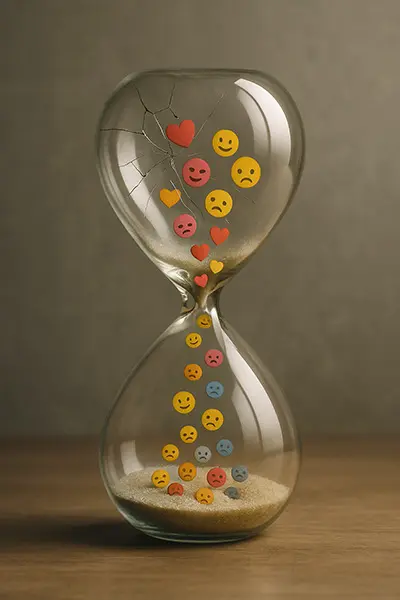
For me, it showed up as this constant low hum of anxiety, like after a family gathering where I mediated every argument to keep the peace, I’d crash and stare at the wall for hours. And yeah, it can be worse if you’re navigating identity stuff; in the LGBT+ world, the added pressure of masking or over-apologizing for who you are can amplify that exhaustion tenfold, making recovery feel even more urgent. Remember, acknowledging this isn’t weakness – it’s the start of recharge.
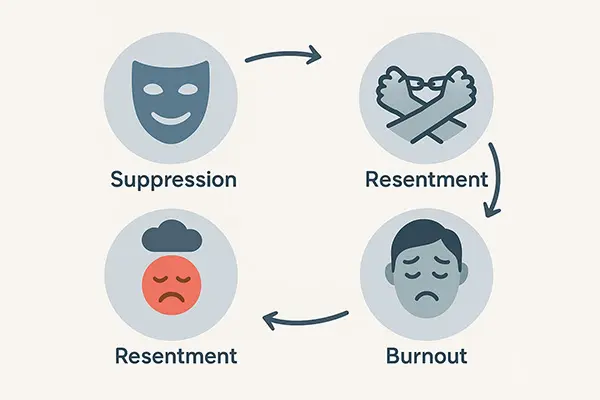
Signs and Symptoms of Emotional Fatigue
Common Indicators You’re Drained
Spotting emotional fatigue isn’t always obvious – it’s those subtle shifts like dreading phone calls or feeling guilty for taking a break. Common signs include constant worry about others’ opinions, physical tension in your shoulders, or that nagging sense of being ‘on edge’ even when things are fine. I recall a phase where I’d wake up tired, not from lack of sleep, but from replaying conversations in my head all night, wondering if I said the right thing.
It’s exhausting, and if you’re in a high-demand job or relationship, it can snowball fast. Experts from Mayo Clinic note that untreated, it leads to cynicism and reduced performance, so paying attention early is key. Ever catch yourself smiling through gritted teeth? That’s a classic indicator you’re drained.
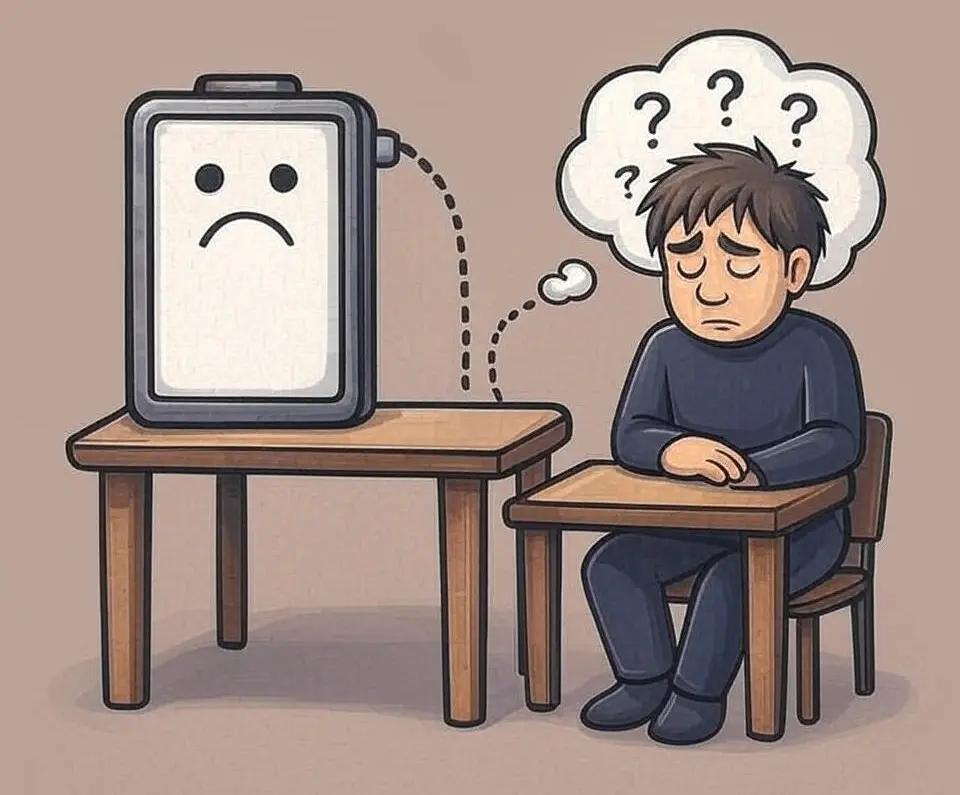
Feeling Empty After Interactions
After hanging out or helping someone, do you ever feel oddly empty, like you gave away pieces of yourself? That’s a big red flag for people-pleasing fatigue – this hollowness where interactions leave you depleted instead of energized. It’s because you’re pouring from an empty cup, suppressing your true feelings to maintain harmony.
One time, after a long chat with a demanding friend, I felt so void I binge-watched shows just to numb out. It’s not dramatic; it’s real. And for LGBT+ individuals, this can intensify if interactions involve hiding parts of your identity to ‘fit in’, adding an extra layer of emotional labor that leaves you even more spent. The good news? Noticing this pattern is huge – it means you’re ready to refill.

Overthinking Responses to Avoid Upset
If you’re constantly overthinking what to say or do to not rock the boat, that’s a sure sign of fatigue brewing. It’s this mental gymnastics where every reply is scrutinized, draining your brainpower on hypotheticals. I used to spend hours crafting texts to sound ‘perfectly agreeable’, only to feel anxious anyway. Psychologists at Harvard Health link this to chronic stress, which fogs your thinking over time.
It’s like your mind’s in perpetual rehearsal mode, never fully present. Funny thing is, it often backfires, leading to more resentment. But hey, breaking it starts with one honest ‘no’ – easier said than done, but worth it.
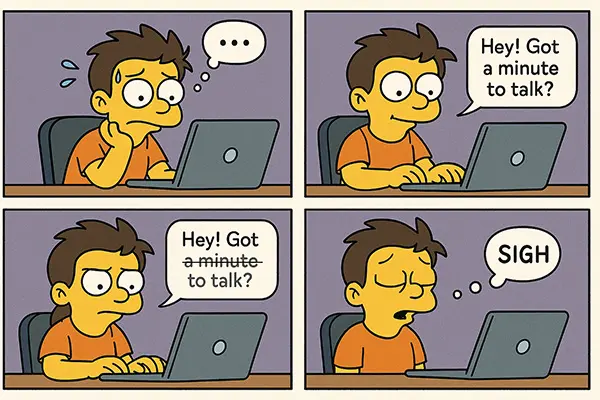
🟨 Table: Checklist of daily signs with yes/no columns for self-assessment.
| Sign | Yes | No |
|---|---|---|
| Do you feel guilty saying no? | ||
| Constant worry about others’ approval? | ||
| Physical tension after social interactions? | ||
| Resentment building towards people you help? | ||
| Difficulty focusing due to mental replay? | ||
| Feeling numb or detached lately? |
Causes and Roots of People-Pleasing
Psychological Origins
Digging into why we people-please often leads back to how we learned to connect – it’s wired in from early experiences where approval equaled safety or love. Psychologically, it’s tied to attachment styles; if you grew up in an environment where expressing needs got shut down, you adapt by prioritizing others. I think of my own roots: as a kid, I saw my mom always smoothing things over to avoid fights, and I copied that without realizing. Sources like the Journal of Personality and Social Psychology point to this as a learned behavior for conflict avoidance. It’s not innate weakness; it’s survival mode gone overtime.
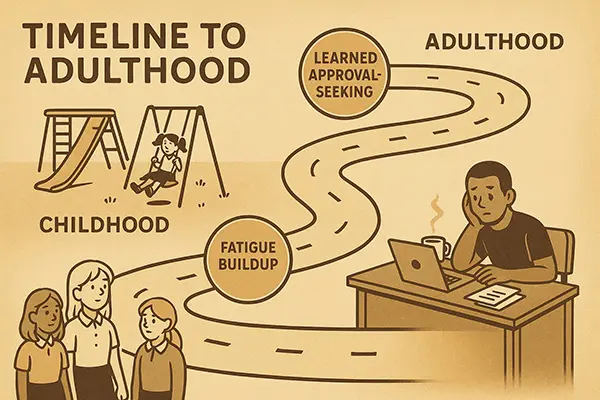
What Is the Root Cause of People-Pleasers?
The root often boils down to fear – fear of rejection, abandonment, or conflict that stems from low self-esteem or past invalidation. Many people-pleasers internalize that their worth is tied to usefulness, making ‘no’ feel like a threat. Trauma-informed therapists at Trauma Recovery note it’s common in those with anxious attachments. For instance, if praise was conditional growing up, you chase it endlessly. In my case, it was subtle – good grades meant affection, so I extended that to friendships. Be wary of ignoring this root; it can lead to deeper isolation.
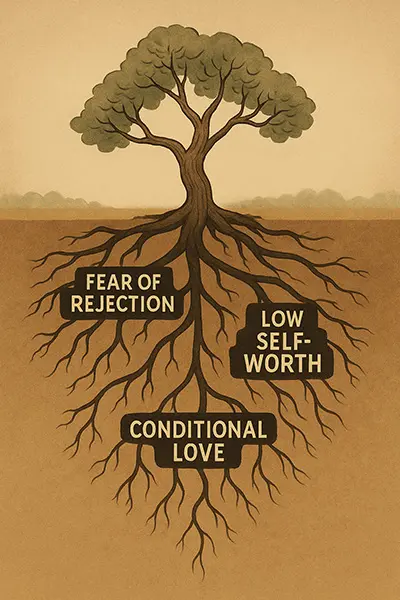
What Trauma Do People-Pleasers Have?
Not all, but many carry traumas like emotional neglect, where needs were dismissed, or abuse where pleasing kept you safe. It could be bullying, parental criticism, or even cultural pressures to conform. For LGBT+ folks, traumas from rejection or hiding identity can fuel people-pleasing as a shield.

I chatted with a friend who, after coming out and facing family pushback, overcompensated by being ‘the perfect’ sibling, leading to burnout. Sites like GoodTherapy highlight how unresolved trauma manifests as hyper-vigilance in relationships. It’s heavy, but understanding it lightens the load.
Why Is Being Emotionally Exhausting?
Being a people-pleaser is emotionally exhausting because it demands constant self-erasure – you’re suppressing authentic responses, which builds internal conflict and uses up mental energy like crazy. Neurologically, it’s like keeping your amygdala in high alert, flooding you with cortisol. Why? Because every interaction becomes a potential minefield.
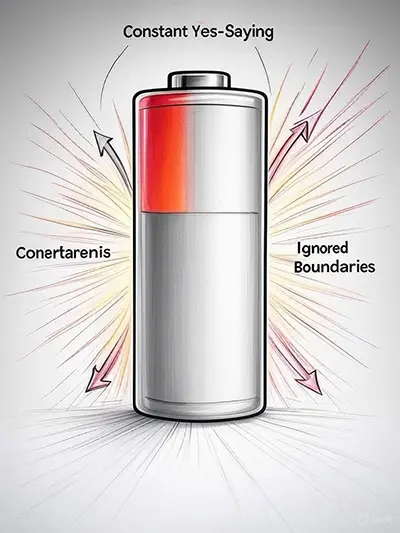
I felt it during a group trip where I organized everything to please everyone, ending up resentful and wiped. It’s unsustainable, as explained by experts at Cleveland Clinic, leading to compassion fatigue. But recognizing why helps you pivot.
🟨 Infographic:
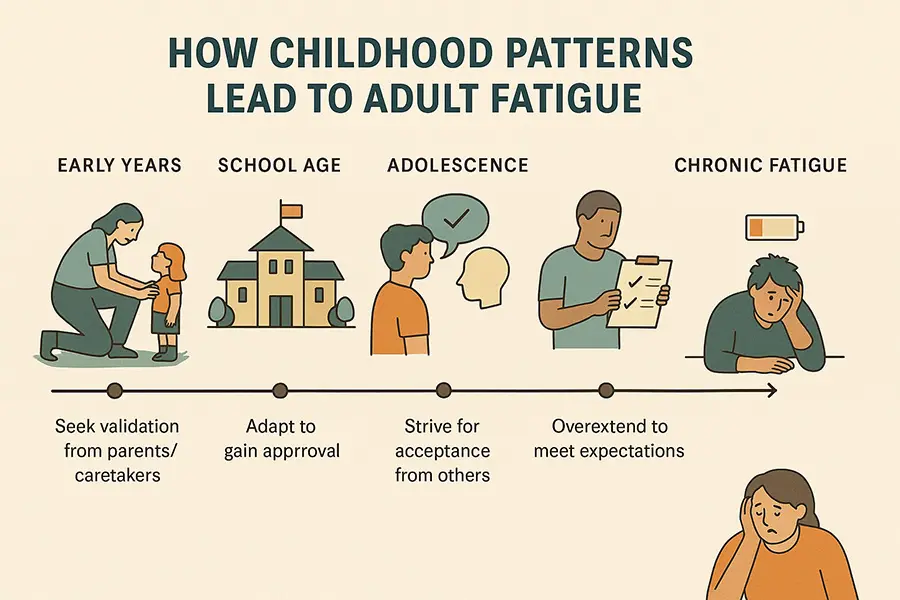
Comparing People-Pleasing to Similar Issues
You know, sometimes it’s hard to tell if what you’re feeling is just people-pleasing wearing you down or something else entirely, like compassion fatigue or straight-up burnout. I mean, they all kinda blur together when you’re in the thick of it, right? But breaking it down helps a ton. People-pleasing fatigue is more about that constant need to keep everyone happy at your own expense, leading to resentment and this quiet inner chaos.
Compassion fatigue hits folks in helping roles, where empathy overload leaves you numb to others’ pain. And emotional burnout? That’s the big one, from prolonged stress making you detached and ineffective overall. From what I’ve read on sites like Talkspace, the key difference is the trigger people-pleasing stems from approval-seeking, while burnout’s often work-related overload. If you’re feeling this mix, check out our post on mental self-care practices for some starting points. Oh, and here’s a handy table to spot the overlaps and differences.
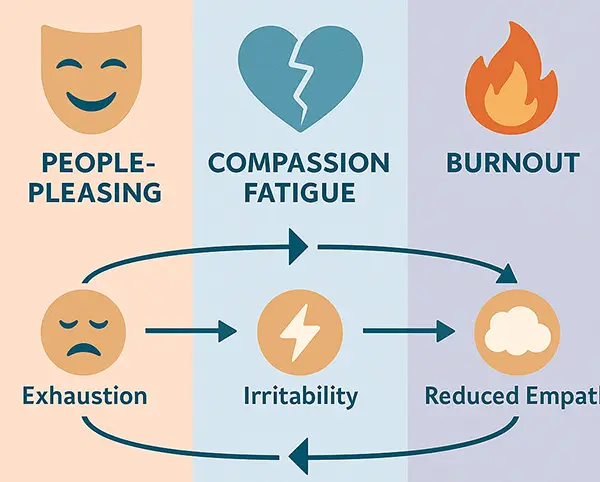
🟨 Table: Comparison chart of People-Pleasing Fatigue vs. Compassion Fatigue vs. Emotional Burnout Syndrome (columns: Symptoms, Causes, Recovery Tips).
| Aspect | People-Pleasing Fatigue | Compassion Fatigue | Emotional Burnout Syndrome |
|---|---|---|---|
| Symptoms | Resentment after helping, guilt for saying no, overthinking interactions, feeling empty. | Numbness to others’ suffering, irritability, reduced empathy, physical aches from emotional drain. | Detachment from work/life, cynicism, low energy, sense of failure. |
| Causes | Fear of rejection, low self-worth, childhood patterns of conditional love. | Prolonged exposure to trauma in helping professions, like nurses or therapists. | Chronic unmanaged stress, high demands without support, lack of work-life balance. |
| Recovery Tips | Set small boundaries, journal needs, practice saying no kindly. | Self-compassion breaks, limit exposure to trauma stories, seek supervision. | Rest and detach, reevaluate priorities, professional therapy for root stress. |
Honestly, seeing it laid out like that made me realize how my own people-pleasing overlapped with burnout during a tough job phase I was helping coworkers nonstop, but it left me cynical and detached at home. A solid read on this is from Charlie Health’s article on compassion fatigue vs burnout. It’s eye-opening how systems can push us into these states without us noticing.
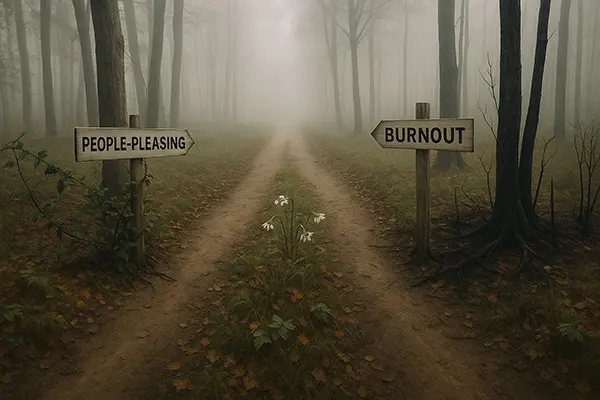
Stages of Recovery from People-Pleasing
Recovery isn’t some straight line; it’s more like a messy squiggle with ups and downs that surprise you. From what folks share on places like Hailey Magee’s blog, there are these bizarre but normal phases like swinging from yes-man to total hermit, or getting annoyed at everything you used to ignore.
I went through that pendulum swing myself after a bad breakup where I realized I’d been pleasing my way through the whole relationship. It starts with recognizing the pattern, then building new habits, but expect some mental exhaustion along the way. Curious about similar emotional patterns? Our guide on knowing yourself for better self-care dives into that self-awareness angle.
Recognizing the Pattern
First off, you gotta spot when you’re in that people-pleasing mode it’s like catching yourself mid-sentence agreeing to something your gut screams no at. Signs? That tight chest when someone’s disappointed, or replaying convos to check if you were ‘nice enough’. I remember staring at my phone after a text from a friend asking for a favor, feeling this wave of dread but typing ‘sure!’ anyway. Why do we do it? Often it’s wired from early stuff, like pleasing parents to feel loved.
As per Psychology Today, self-awareness is key journal what triggers it, and suddenly patterns pop out. Try listing three times you said yes when you meant no this week; it’s a gentle start. For LGBT+ folks, this recognition can be trickier if pleasing stems from masking identity to fit in I’ve heard stories where coming out meant relearning boundaries without the old guilt.

Why Are People-Pleasers Exhausting?
People-pleasers are exhausting because they’re always on scanning for cues, suppressing real feelings, which spikes cortisol like crazy. Neurologically, it’s that amygdala firing overtime, treating every social thing as a threat. Why? Evolutionarily, group harmony kept us safe, but in modern life, it backfires into chronic fatigue. I felt it during family holidays, mediating every little spat until I was drained and snappy. A deep dive from Verywell Mind explains how this leads to emotional dysregulation. It’s not just tiring; it can mess with dopamine, making joy harder to feel. Watch out for ignoring this it amps up anxiety over time.
Building New Habits
Once you see the pattern, it’s time to swap old habits for ones that honor you like practicing pauses before answering requests, or affirming your worth daily. Start small: next time someone asks for help, say ‘let me think about it’. I tried that at work and wow, the world didn’t end. Building these takes patience; expect slip-ups, but each no builds resilience. From Medium articles on recovery, habits like positive self-talk shift that inner critic. And yeah, it might feel mentally exhausting at first, but that’s the brain rewiring.

Why Is Everything Mentally Exhausting?
Everything feels mentally exhausting in recovery because you’re unlearning autopilot that constant vigilance drains your cognitive load, like running apps in the background on your phone. Psychologically, it’s decision fatigue plus guilt hormones kicking in. Remember when I first set a boundary with my roommate? My mind raced for hours after, replaying worst-case scenarios.
It’s normal; as per trauma-informed views, it’s the nervous system adjusting. But hang in there over time, it frees up energy. For more on mental drain, our piece on emotional healing from stress hits close.
Practical Tools and Exercises
Alright, let’s get hands-on tools aren’t magic, but they sure help reclaim that lost energy. Think breathwork for guilt spikes, or journaling to uncover what you really want. I started with daily check-ins, asking ‘what do I need today?’ and it shifted things slowly. Experts from Tiny Buddha suggest embracing praise without deflection, which felt awkward but liberating. These aren’t overnight fixes, but consistent tweaks add up. If you’re burnt out, pair this with our mindful journaling guide.
Daily Practices to Reclaim Energy
Kick off with micro-practices: hydrate first thing, then a quick gratitude list to counter resentment. Walk outside, notice the breeze it grounds you outta that mental loop. I do a ‘energy audit’ eveening, noting what drained vs boosted me. Simple, but it builds awareness. Breathwork’s gold too; when guilt hits, try 4-7-8 breathing to calm the sympathetic nervous system. From a neuroscience angle, this lowers cortisol, letting prefrontal cortex handle decisions better. Recovery tip: Aim for one boundary a day, like declining a non-essential invite feels scary, but empowering.
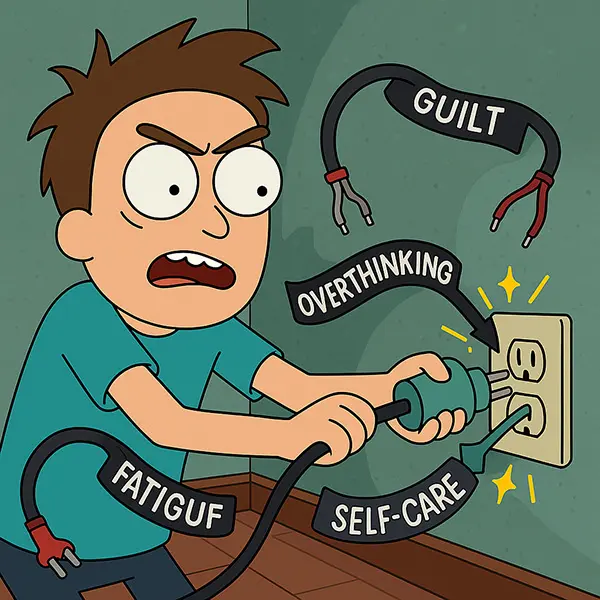
How to Stop Being a People-Pleaser But Still Be Nice?
Stopping doesn’t mean turning cold it’s about authentic kindness without self-sacrifice. Practice ‘kind nos’: ‘I’d love to, but I can’t right now’. I tested it on a coworker asking for last-minute help, and guess what? They understood. Coach Simona’s cheatsheet suggests starting with small opinions, like choosing a restaurant without deferring. Stay nice by listening actively, but honor your limits. It’s balance, not swing to jerk mode. Haha, imagine pleasing everyone? You’d be a doormat with a smile.
Breathwork for When Guilt Arises
Guilt pops up like an uninvited guest, but breathwork shoos it away. Try box breathing: inhale 4, hold 4, exhale 4, hold 4 repeats for 5 minutes. It activates parasympathetic response, easing that chest tightness. I use it before tough convos, like telling family no to extra chores. From Suzanne Heyn’s tips, pair with journaling why the guilt’s there often it’s old programming. Deep belly breaths help too; feel the rise and fall, grounding you in the present.
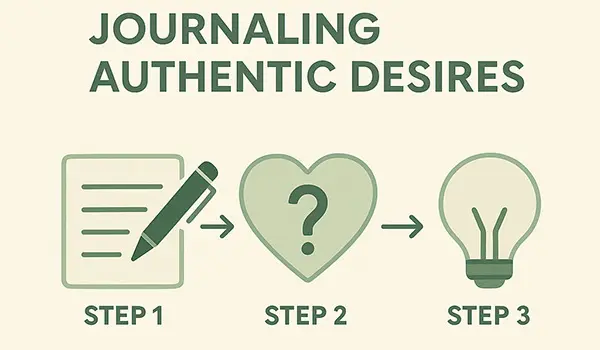
Case Studies and Real-Life Scenarios
Real stories hit different they show you’re not alone in this mess. From relationships tanking to dating disasters, people-pleasing sneaks in and wrecks havoc. I recall a friend whose marriage crumbled because she never voiced her needs, building silent resentment. HuffPost confessions nail it: that facade hides true feelings, starving connections. Let’s unpack some scenarios.
Stories of People-Pleasing in Relationships
In friendships or family, it shows as always mediating, like I did at gatherings, ending up resentful while others chilled. One story from Reddit: a fiance’s pleasing led to terrible choices, straining trust. It ruins bonds by blocking honesty partners feel the disconnect without knowing why. For LGBT+ peeps, it can amp up if pleasing masks identity fears, like over-accommodating in queer circles to avoid rejection, leading to burnout in safe spaces too. Parade’s therapist insights say it fosters imbalance, where one gives endlessly.

People-Pleasing Ruined My Life: A Personal Account
Man, it nearly did for me years of yes-ing left me isolated, jobs I hated, friends who took advantage. Like in Medium tales, I hid my world from partners, depriving them of real me. Woke up one day feeling like a shell, no hobbies, just obligations. Recovery started with therapy, admitting the fear of abandonment drove it. Now? Life’s fuller, but dang, the regret lingers.
Dating Challenges and Red Flags
Dating as a pleaser? Red flags everywhere ignoring gut feelings to keep dates happy, like agreeing to plans you dread. Stories from YouTube vids show it leads to mismatched pairs, where authenticity’s missing. One account: fell for a pleaser who feared conflict, turning love into a nightmare of unspoken issues. Watch for over-apologizing or shape-shifting opinions it’s a sign. But recovery flips it; honest nos build real connections.
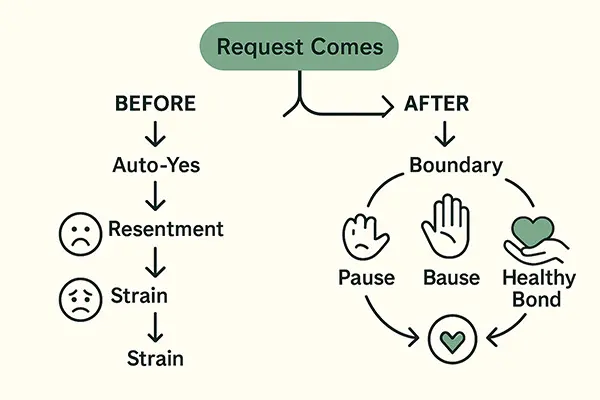
Checklist for Prevention and Progress
Okay, let’s talk about keeping this people-pleasing thing in check without it feeling like another chore on your list. You know, prevention isn’t about flipping a switch overnight; it’s those little wins that stack up, like saying no to that extra coffee run at work and not feeling the world end. I remember starting with a simple sticky note on my desk: “Does this serve me?” and it helped me pause before jumping in to fix everyone’s mess.
From what I’ve seen in therapy circles, like on Psych Central, tracking progress builds that self-trust muscle, turning vague guilt into clear boundaries. If you’re feeling the drag, our post on emotional boundaries has some real gems for day-to-day tweaks. And hey, here’s a table to make it tangible print it out, stick it somewhere you see daily, and check off as you go. It’ll feel good, promise.
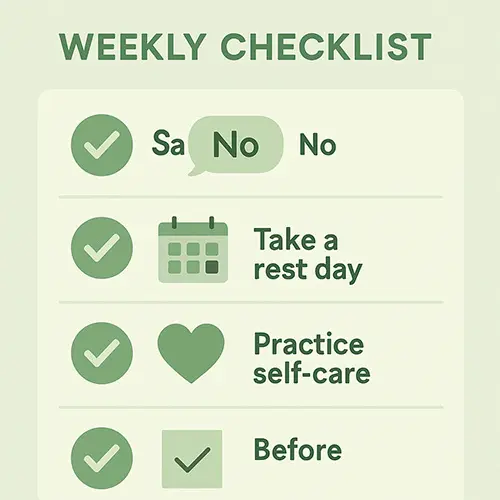
🟨 Table: Progress checklist with items like “Practiced a small no this week” and tracking columns.
| Item | Week 1 | Week 2 | Week 3 | Notes |
|---|---|---|---|---|
| Practiced a small no this week | ||||
| Journaled one need I ignored | ||||
| Set one boundary with a friend | ||||
| Took time for self without guilt | ||||
| Noticed resentment and paused | ||||
| Celebrated a win, no matter small |
These aren’t rules, just gentle nudges. I ticked off my first ‘no’ after a family call said I couldn’t chat long, and guess what? No drama. It was weirdly freeing, like the air got lighter. Try adding a quick breath before decisions; it calms that knee-jerk yes. For folks in the LGBT+ community, this checklist can hit different maybe track times you pleased to avoid judgment in social circles, turning it into a tool for authentic self-expression without the extra layer of fatigue from masking.
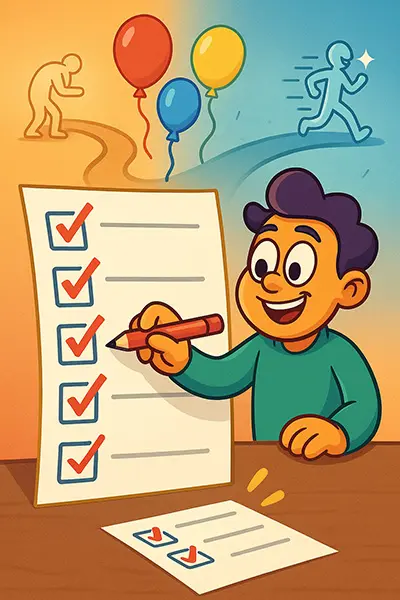
Warning Signs and When to Seek Professional Help
Sometimes the fatigue creeps so slow you miss the big red flags waving, right? Like, you’re fine until suddenly you’re not, and everything feels heavier than it should. Warning signs aren’t just tiredness; they’re those deep gut feelings that something’s off, pushing you toward isolation or worse.
I once ignored my own signals during a busy season, thinking it was normal, but it snowballed into days where getting out of bed felt impossible. Experts at APA note that unchecked emotional exhaustion can link to bigger issues like depression, so don’t brush it off. If it’s messing with your sleep or joy, time to chat with a pro therapy’s not a fail, it’s a reset. Check our guide on mental wellness for spotting early vibes.

Red Flags Indicating Deeper Issues
Red flags? Think constant dread before social stuff, or that pit in your stomach when someone’s unhappy, even if it’s not your fault. Deeper ones include numbness to your own wants, or snapping at loved ones outta nowhere that’s the resentment bubbling up. From neuroscience angle, chronic people-pleasing spikes cortisol, messing with your brain’s reward system, making everything feel blah.
I saw it in a buddy who pleased his way through jobs, ending up with anxiety attacks; turns out, it was tied to old family stuff. If you’re avoiding alone time cause it brings up too much shame, that’s a big one don’t ignore it. Hormonally, low dopamine from constant self-denial can mimic depression symptoms, per studies in Journal of Personality.

Can You Trust a People-Pleaser?
Trusting a people-pleaser? Tricky, cause their yes might not mean yes it’s often fear talking, leading to flaky commitments or hidden resentment. You wonder if they’re real with you, or just avoiding conflict. I dated one once; everything seemed smooth til the buildup exploded in passive digs. Psychologically, it’s rooted in avoidance, making authenticity hard. But yeah, with work, they can learn honest no’s, building real trust. A solid read on this is from Verywell Mind’s take on people-pleasing relationships.
People-Pleasing and Emotional Unavailability
People-pleasers often come off unavailable emotionally, cause they’re so busy tuning to others they lose touch with their own feels. It’s like a wall up, not from coldness, but exhaustion suppressing needs leaves little for deep connections. Think about it: if you’re always performing, when do you share the real you? In LGBT+ spaces, this can amp up, pleasing to fit norms while hiding vulnerabilities, leading to lonelier bonds. From a psych view, it’s emotional labor overload, per Harvard Health, draining empathy reserves.

Research, Studies, and Statistics
Diving into the research, it’s fascinating how much data backs up why people-pleasing wrecks your energy. Studies show it’s not just ‘being nice’ it’s a pattern tied to stress hormones that wear you down over time. A YouGov poll found 49% of adults ID as people-pleasers, often leading to higher burnout rates.
APA reports 32% emotional exhaustion in general pop, but for pleasers, it’s amplified by constant vigilance. Neurologically, fMRI scans reveal heightened amygdala activity, like your brain’s always on alert for disapproval, spiking cortisol and tanking serotonin. That’s why it feels so draining your body’s in perpetual fight-or-flight lite mode.
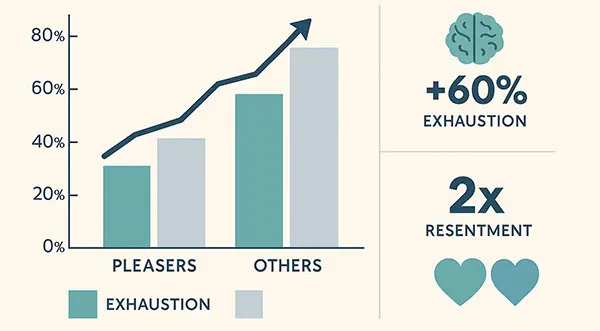
Key Findings on People-Pleasing
Key findings? One biggie: pleasers report more resentment and lower life satisfaction, per Psychology Today pieces. A 2023 study in Personality and Individual Differences linked it to dependent depression traits, where rejection fear drives the cycle. Another from Wiley: validating people-pleasing scales showed strong ties to anxiety disorders. I recall reading how in work settings, pleasers harm performance by avoiding feedback, creating echo chambers. It’s eye-opening evolutionarily, it helped tribes survive, but today it backfires into isolation.
What Are People-Pleasers Afraid Of?
At core, pleasers fear rejection, abandonment, looking selfish roots often in childhood where love was conditional. Psych roots trace to attachment theory; anxious styles please to secure bonds. Trauma like neglect amps it, making ‘no’ feel like loss. Per Quora psychs, it’s approval addiction, misguided belief worth ties to usefulness. Deep down, it’s fear of not being enough alone; therapy rewires that to self-validation.
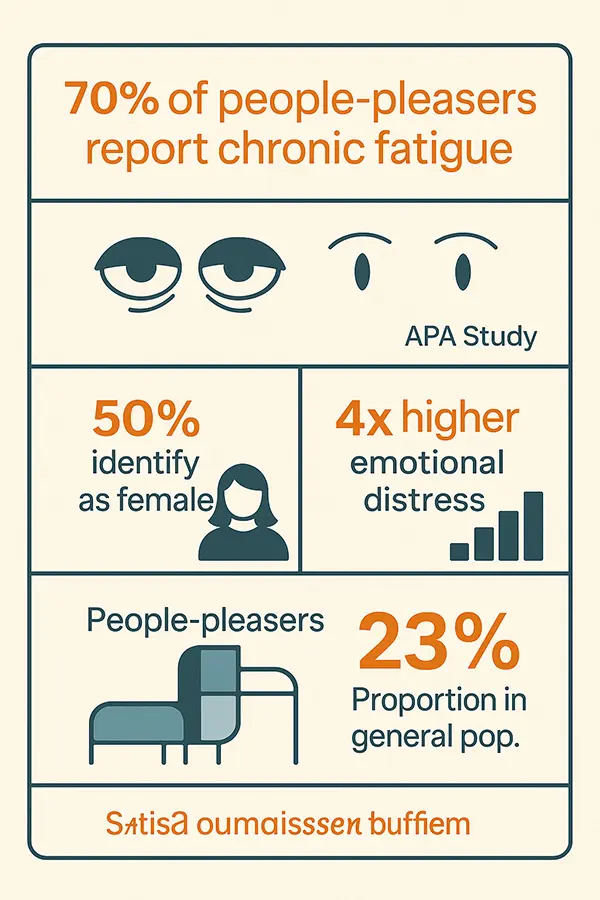
Frequently Asked Questions (FAQ)
Got questions bubbling up? You’re not alone these pop up a lot for folks wrestling with this. Let’s break ’em down real, no fluff.
Problem: You’re constantly sacrificing your time and energy to make others happy, ignoring your own tank running low. Agitate: Over months, that builds quiet resentment, leaving you isolated even in crowds, snapping at small stuff cause everything’s overwhelming. Target: Start with boundaries like our productivity and inner balance tips to recharge and feel that spark again, turning yes into mindful choices.
Problem: Yeah, often roots in childhood where pleasing kept you safe or loved. Agitate: Those unhealed wounds keep you stuck in loops, fearing every no ends a bond, amping anxiety daily. Target: Therapy dives deep, rewriting patterns; try EMDR or CBT, like resources from Trauma Recovery suggest, for freedom without the weight.
Problem: Their habits create imbalance, where you’re guessing their real feels. Agitate: It breeds distrust, emotional distance, maybe fights over unspoken stuff. Target: Encourage open chats without judgment model vulnerability, suggest joint therapy from places like BetterHelp, fostering growth together.
Problem: Guilt hits hard when you shift, like you’re breaking some inner rule. Agitate: It keeps you exhausted, perpetuating the cycle till you’re numb. Target: Redefine kindness as balanced self-care isn’t selfish; it’s sustainable. Journal daily to reframe, as in our self-awareness growth guide.
Problem: Suppressing needs hides your true self, starving emotional clarity. Agitate: Leads to numbness, where joy’s MIA and everything feels pointless. Target: Build self-awareness through mindfulness; studies show it restores serotonin balance, check APA’s burnout insights for more.
Problem: Avoidance shows as red flags, like dodging tough talks. Agitate: Builds unequal dynamics, resentment simmering under surface charm. Target: Practice vulnerability share real wants early; it draws genuine connections, per dating psych from eHarmony.
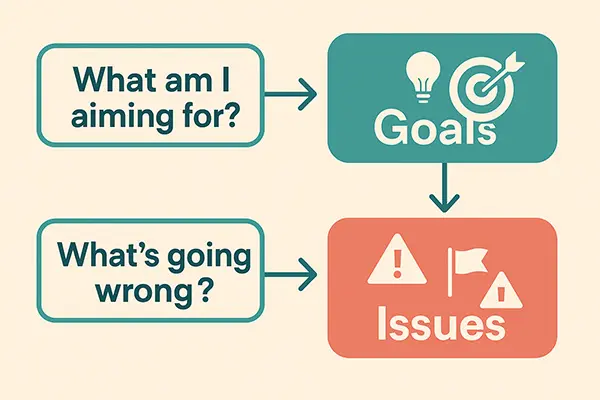
Resources and Reliable Links
Wrapping this up, if you’re ready to dig deeper, resources are your lifeline no shame in leaning on ’em. Start small, build from there, and remember, reclaiming your no is the ultimate yes to yourself. Head to our emotional healing for more tools, or book a session if it resonates. You’ve got this step into that balanced life today!
Recommended Books and Articles
Books? “The Disease to Please” by Harriet Braiker nails the myths, super practical for breaking habits. “Set Boundaries, Find Peace” by Nedra Tawwab’s a game-changer, with real exercises. For articles, Psychology Today’s people-pleasing basics dives deep. Or CNBC’s piece on pleasers and burnout.
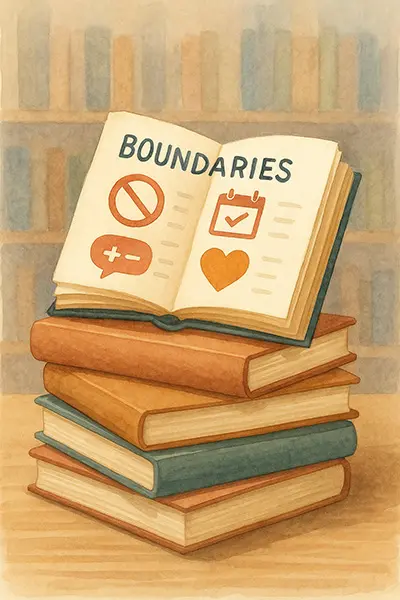
Support Organizations and Therapists
Organizations like NAMI offer free support groups for mental health. APA’s therapist finder is gold for pros specializing in boundaries. BetterHelp connects you online easy start. For LGBT+ focused, The Trevor Project has resources tailored to identity-related pleasing pressures.
✨ Last updated on 26.08.2025
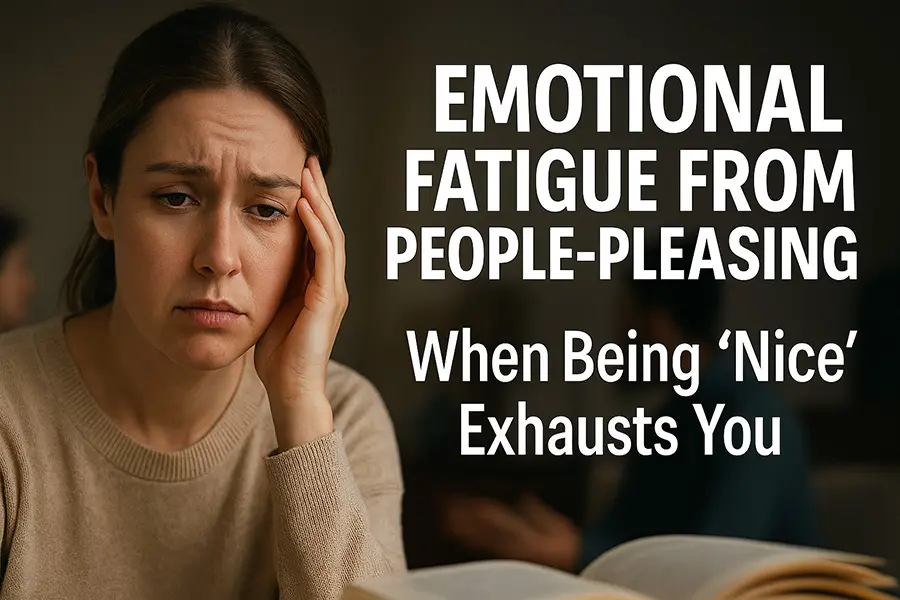
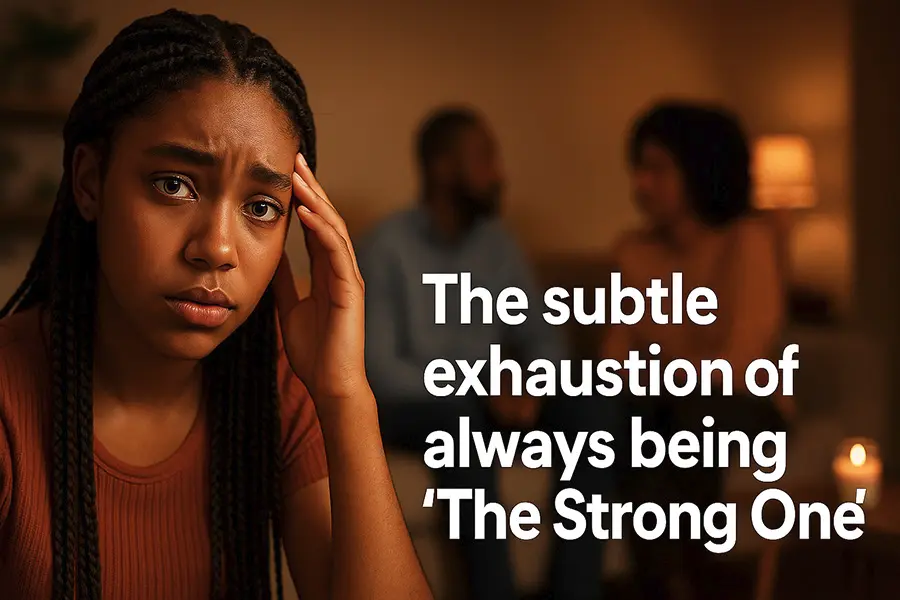
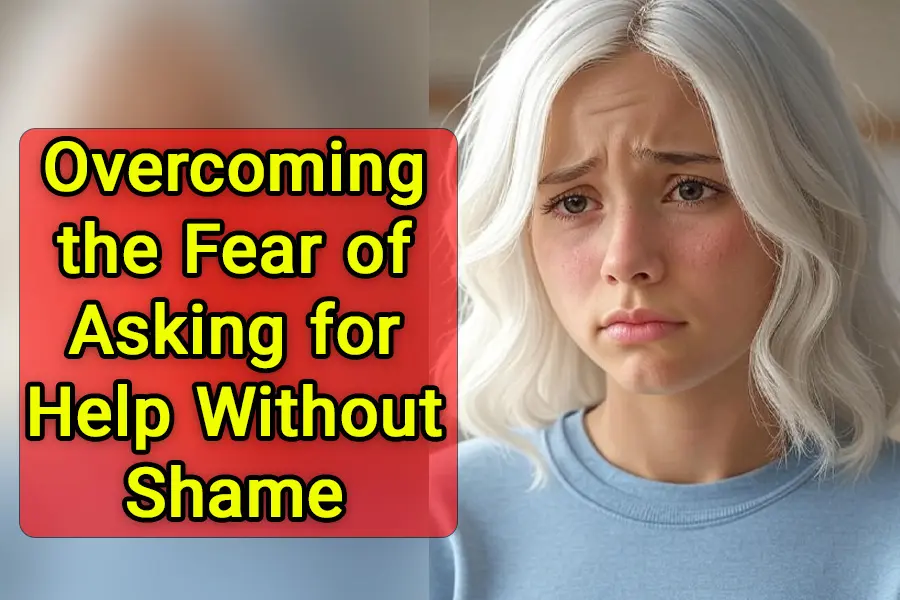
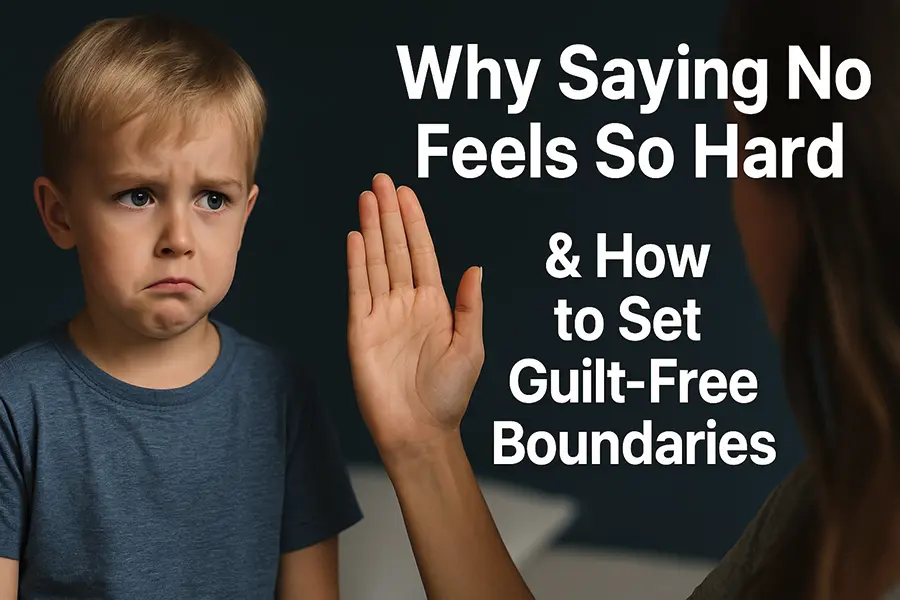










Leave a Reply